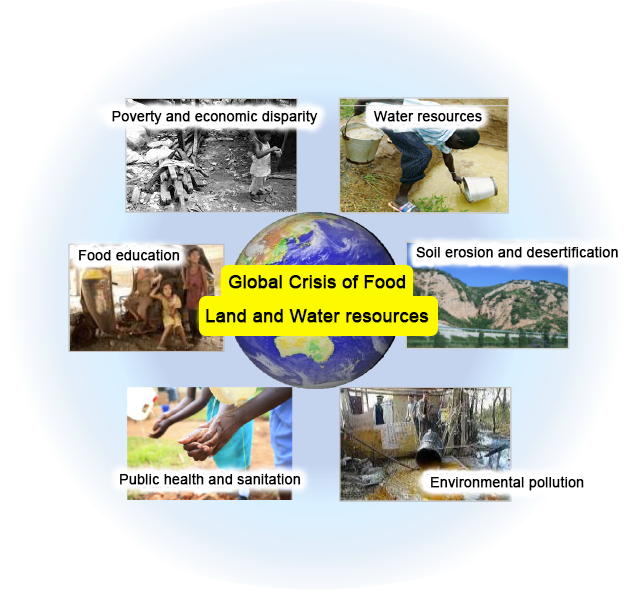About us
About the Graduate School of Global Food Resources
The Graduate School of Global Food Resources will be established to produce pioneering world-class leaders to tackle the global food resources crises looming on the horizon.
Global food, water and soil resources crises
Food inventory levels have been decreasing in the 21st century alongside rapid population increases primarily seen in developing countries, such as India, China and other countries in Asia and Africa. In fact, global food supply has failed to meet growing food demand. This shortfall is due to the soil degradation and a decrease in arable land caused by factors including the urbanization of farmland stemming from population growth, a shortage of farm successors in developed countries, desertification due to global climate change, and salinization. Agricultural production requires water, but the finite water resources on the earth are needed for numerous uses beyond agriculture. Population growth has also increased demand for water for domestic, industrial and other uses, making adequate water management essential. The world must develop multifaceted measures to address these challenges.
Advances in science and technology have enhanced food production efficiency as they enable the production of genetically modified crops and the use of pesticides, chemical fertilizers and other innovations. On the other hand, people have a growing awareness of food safety, culinary culture and the relationship between diet and health. Against such a background, understanding when, where and what types of food are required is also an important issue.

Need for global pioneering leaders
A number of other issues, including environmental pollution, food contamination and poverty/ economic inequality, must also be discussed when considering food resources. However, these issues have been studied separately in respective fields of specialization. Moreover, they have been considered to be local in physical and scientific terms, and the solutions provided have been intended to address local issues. However, since food resources problems are global challenges, they also need to be looked at from a perspective where local issues are viewed as global challenges – a “glocal” approach.
For example, increased agricultural productivity using advanced technology is considered as a solution in a famine-stricken region. However, famine elimination also requires consideration of the local environment, including climate, natural features and water availability. It is also necessary to know what should be produced and what should be controlled based on a multifaceted consideration of the region, including the local political situation, economic strength, production costs and the need for the maintenance and improvement of local residents’ well-being.
The situation requires the development of future leaders with broad knowledge in the areas of food “production,” “environment” and “governance,” which cover people’s living environments, culture and eating habits.
Education integrating the humanities and sciences provided by a diverse faculty, and contribution to the development of a recycle-oriented society
To develop future leaders with a broad knowledge of food resources, the School’s faculty includes specialists in a wide range of fields, including food production technology, food processing, food preservation, logistics, economics, culture, the environment, and public health, who are invited not only from Japan but also from abroad. The most distinctive feature of the School’s Master’s Degree Program is the opportunity for students to conduct multidisciplinary studies in all these fields.
The School’s curriculum, which integrates the humanities and sciences, includes lectures on fundamental science subjects and those on the know-how to organize international conferences.
The School aims to produce internationally minded experts who can undertake the role of team leaders to address global food, water and soil resource issues.

